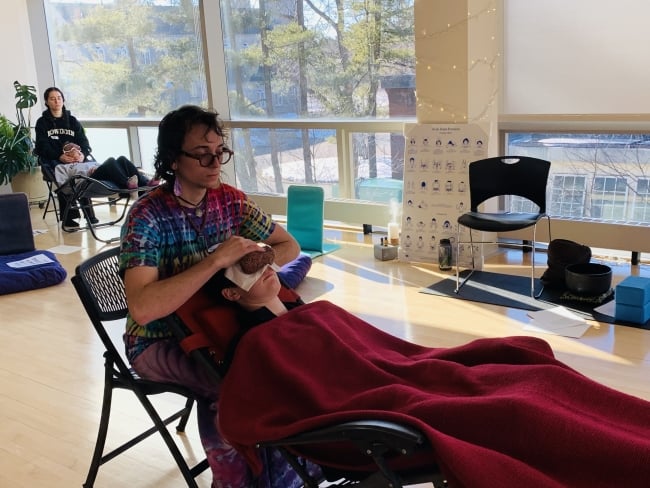You have /5 articles left.
Sign up for a free account or log in.

Bowdoin College students can participate in a weekly Reiki clinic to destress from their academics.
Bowdoin College
Many colleges and universities want their students to be healthy, happy and thriving while enrolled, but getting students to invest in their well-being can be a challenge.
Two-thirds of respondents to a May 2024 Student Voice survey by Inside Higher Ed said their mental health was affecting their ability to focus, learn and perform academically, and approximately half indicated their physical health impacted their ability to succeed as well.
At the same time, fewer than half of respondents gave their campus excellent ratings for health and wellness services. Forty-three percent of respondents said the quality and variety of health and wellness services was good or excellent; an additional one-third said services were average. Roughly one in four students indicated wellness facilities and class offerings needed improvement in a 2023 survey, as well.
Inside Higher compiled seven examples of atypical new wellness offerings colleges are providing for students to encourage them to prioritize their physical, emotional and mental health.
What’s the need? Student well-being continues to be a key priority for college and university leaders seeking to improve retention, given that one in five students who stop out say mental health was a primary barrier to college completion.
More than half of Gen Z respondents say better health is one of their top wellness concerns, particularly managing stress and anxiety, according to a recent McKinsey survey.
Students also recognize the need to stay active and care for themselves holistically; a 2024 survey found that nearly half of Gen Z (43 percent) said that improving mental health is a primary motivator for working out. A 2023 survey of Gen Z across the globe found that only one-third exercise regularly, though half want to start.
- Purdue University—Combating Seasonal Allergies
Purdue’s Center for Healthy Living is hosting a workshop this summer on how students can prepare for pollen and other allergens, titled Seasonal Allergies: A Guide to Combating Symptoms. The virtual workshop is part of the Healthy Boiler Workshop series and is led by a registered nurse health coach. During the virtual workshop, students will learn about causes, symptoms, treatment options and prevention strategies of seasonal allergies.
Healthy Boiler Workshops, which are designed to help educate the campus community on health and wellness topics, are available to faculty, staff and dependents on a Purdue health plan.
- California State University, Stanislaus—Jiu-Jitsu
The CSU Stanislaus campus recreation office offers a variety of fitness classes to help improve students’ physical wellness. Jiu-jitsu was recently introduced, taught by a student with a black belt and 15 years of experience, according to the university’s student paper. The university also offers capoeira, hip-hop dance and cycling classes as group fitness options.
- Bowdoin College—Reiki and Acupuncture Clinics
Since the Bowdoin community returned to campus following COVID-19 closures, the college has offered students Reiki sessions, in addition to already established acupuncture clinics, to help them destress throughout the year.
Acupuncture sessions take place in a multipurpose room on a first-come, first-served basis for 25-minute appointments. Students sign up in advance for Reiki healing sessions, also offered in a multipurpose room, for about 20 minutes at a time.
- Loyola Marymount University—Generative Conflict
LMU is home to a Truth, Community Healing and Transformation Alliance, which unites campus and community partners “to create equitable, reciprocal and authentic connections,” according to the university’s website. The center focuses on helping students, faculty and staff connect across differences, focus on relationship building and articulate their views and experiences more clearly.
As part of the work, the university hosts a workshop series on helping community members engage in healthy conflict, including how to increase awareness of their nervous system reactions, de-escalate conflict and engage in difficult conversations in productive ways.
- Dartmouth College—Zen and the Art of Mindful Living
In April, Dartmouth welcomed ten Buddhist Dharma teachers from Deer Park Monastery in California to lead a week of programming around mindfulness as a way to cultivate peace, happiness and resilience.
The guided meditation practice workshops, presentations and discussions were open to any students, with no prior experience needed. Students could also opt in to a 4.5-hour or two-day mindfulness retreat during the teachers’ residency, where they engaged in guided meditations and other contemplative practices at a discounted rate.
- Rutgers University, Newark—Power Your Potential
Power Your Potential is a student mental health initiative that helps students embrace their physical, emotional and mental health through a variety of programs and workshops, in addition to traditional counseling.
Some students can be hesitant to engage in therapy, so staff created different opportunities to meet students where they are, recognizing their various interests and experiences. Power Your Potential offerings include fitness courses such as yoga, Zumba and massages led by counseling center staff. These spaces help introduce students to staff and like-minded peers.
Additionally, students can attend creative arts workshops or performances at the New Jersey Performing Arts Center to help improve their emotional well-being and boost social connection.
- University of Colorado, Boulder—Wilderness Workshops
The Boulder region is known for its beautiful natural features—perfect for rock climbing in the summer and shredding the slopes in the winter. To equip students to take advantage of the region’s offerings, CU Boulder hosts wilderness workshops, teaching students how to identify wildflowers, cook in the back country, wax their skis or paint the beautiful scenery.
Each course has a $10 or $20 fee associated to cover supplies, and offerings are designated by season.
Do you have a wellness intervention that might help others promote student success? Tell us about it.




